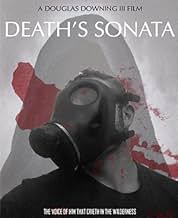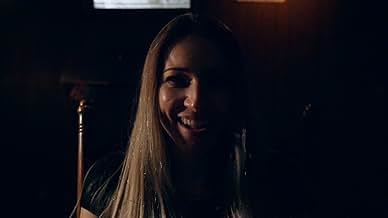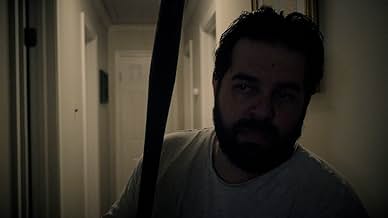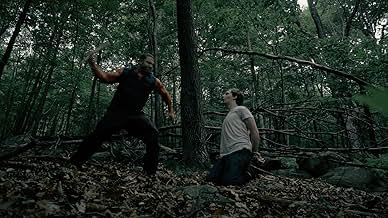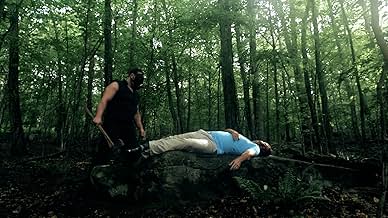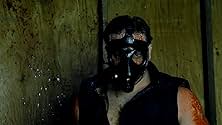Ajouter une intrigue dans votre langueThe story of a man suffering from Schizophrenia and the psychotherapist who tries to find him with the help of his young Bi-Polar patient.The story of a man suffering from Schizophrenia and the psychotherapist who tries to find him with the help of his young Bi-Polar patient.The story of a man suffering from Schizophrenia and the psychotherapist who tries to find him with the help of his young Bi-Polar patient.
- Réalisation
- Scénario
- Casting principal
Dannah Kelly
- Mandy
- (as Dannah Basgall)
Avis à la une
Just finished watching Death's Sonata and wow... this one really stuck with me. It's definitely not your typical horror movie. It's slow, creepy, weird as hell at times - but super original and I respect the hell out of it for that.
The story follows this therapist, Dr. Fredrickson, who's treated all kinds of patients - but there's one guy, Charles, that really messed with him. Charles has schizophrenia and things got so bad that he completely disappeared from treatment and went off to live in this cabin in the woods. Problem is, he believes Death - like actual Death, the Grim Reaper - is talking to him and telling him to kill or be killed. Yeah. It's dark.
As bodies start turning up, the doctor starts thinking Charles might be involved. So he sends one of his new patients, Matthew (who has his own mental health struggles), to go find him. It kind of turns into this really tense manhunt, but not in the action sense - more like a psychological slow burn with a constant sense of dread hanging over everything.
What I really liked was how original the whole thing felt. I watch a ton of horror, especially indie stuff, and this didn't feel like a ripoff of anything. The whole concept of Death manipulating someone with mental illness felt disturbing and sad but also kind of brilliant. The atmosphere is thick - like, you feel the isolation and mental decay. The cabin scenes are super eerie, especially when Charles is just talking to himself... or maybe not?
The acting was solid - especially the guy playing Charles. You really feel bad for him even while knowing he's probably doing terrible things. And the music/sound design? Creepy AF. It's one of those movies that gets under your skin.
The story follows this therapist, Dr. Fredrickson, who's treated all kinds of patients - but there's one guy, Charles, that really messed with him. Charles has schizophrenia and things got so bad that he completely disappeared from treatment and went off to live in this cabin in the woods. Problem is, he believes Death - like actual Death, the Grim Reaper - is talking to him and telling him to kill or be killed. Yeah. It's dark.
As bodies start turning up, the doctor starts thinking Charles might be involved. So he sends one of his new patients, Matthew (who has his own mental health struggles), to go find him. It kind of turns into this really tense manhunt, but not in the action sense - more like a psychological slow burn with a constant sense of dread hanging over everything.
What I really liked was how original the whole thing felt. I watch a ton of horror, especially indie stuff, and this didn't feel like a ripoff of anything. The whole concept of Death manipulating someone with mental illness felt disturbing and sad but also kind of brilliant. The atmosphere is thick - like, you feel the isolation and mental decay. The cabin scenes are super eerie, especially when Charles is just talking to himself... or maybe not?
The acting was solid - especially the guy playing Charles. You really feel bad for him even while knowing he's probably doing terrible things. And the music/sound design? Creepy AF. It's one of those movies that gets under your skin.
This film surprised me. It's flawed, yeah, but when it goes for it-it really goes for it. The violence hits hard, not just for shock value, but because it means something in the story. The payoff in a few of those scenes was brutal in the best way. You feel the weight of it. What holds it back is consistency. Some transitions felt jarring, a few scenes drag, and there are definitely moments where the momentum dips. But it always picks back up, usually with something that punches you in the gut-visually or emotionally. What I appreciated most is that it doesn't hold your hand. It assumes you're paying attention, and it's not afraid to be ugly or uncomfortable. That takes guts. It's not polished, but it's personal. You can feel that.
Every now and then, a horror film slips through the cracks of the studio machine, drenched in grit, passion, and raw psychological terror. Death's Sonata is one of those rare indie slasher gems that deserves to be whispered about at midnight horror marathons and scribbled onto bathroom stalls in red ink.
Directed with a veteran's eye by Douglas Downing III, this is not your typical body count flick. Sure, there are kills - brutal, deliberate ones - but this isn't about gore for gore's sake. This is about decay. Of the mind, of morality, of a man's grip on reality. And it's horrifying.
Dr. William Fredrickson (played with haunting restraint by Morrison James) isn't your Final Guy or your masked avenger. He's a seasoned shrink clinging to reason as his greatest failure - Charles - slips deeper into madness. Charles is no ordinary killer. He's a schizophrenic outcast who's literally being compelled by Death, the Grim Reaper himself. Whether that's metaphor or manifestation is up for debate, and the film never spoon-feeds you an answer. That's what makes it brilliant.
What Death's Sonata does so well is blend psychological horror with slasher mechanics. It creeps rather than sprints. The woods feel claustrophobic, the hunting cabin like a tomb waiting to be filled. There's a mythic, almost religious undertone - Death isn't just a figure in black; he's a judge, jury, and executioner, and Charles is his trembling scribe.
But don't worry, gorehounds - you'll get your fix. The kills, when they come, are vicious, intimate, and full of dread. No over-the-top chainsaws or cheesy one-liners. This is murder with meaning.
And then there's Matthew - the wildcard. A manic-depressive patient sent to hunt another. His descent into the woods feels like Apocalypse Now through a Friday the 13th lens. By the time the police get involved, it's less about law and more about damage control. There's no justice here - only consequences.
The score is minimalist but bone-chilling. The cinematography has that grimy '70s edge we all crave - think The Prowler meets Session 9. And the pacing, while slow at first, is purposeful. This is a story about erosion - of sanity, of safety, of salvation.
In the end its a chilling, cerebral slasher with a heart full of darkness. If Henry: Portrait of a Serial Killer and The Babadook had a backwoods baby raised on Phantasm and The Seventh Seal, this would be it.
Directed with a veteran's eye by Douglas Downing III, this is not your typical body count flick. Sure, there are kills - brutal, deliberate ones - but this isn't about gore for gore's sake. This is about decay. Of the mind, of morality, of a man's grip on reality. And it's horrifying.
Dr. William Fredrickson (played with haunting restraint by Morrison James) isn't your Final Guy or your masked avenger. He's a seasoned shrink clinging to reason as his greatest failure - Charles - slips deeper into madness. Charles is no ordinary killer. He's a schizophrenic outcast who's literally being compelled by Death, the Grim Reaper himself. Whether that's metaphor or manifestation is up for debate, and the film never spoon-feeds you an answer. That's what makes it brilliant.
What Death's Sonata does so well is blend psychological horror with slasher mechanics. It creeps rather than sprints. The woods feel claustrophobic, the hunting cabin like a tomb waiting to be filled. There's a mythic, almost religious undertone - Death isn't just a figure in black; he's a judge, jury, and executioner, and Charles is his trembling scribe.
But don't worry, gorehounds - you'll get your fix. The kills, when they come, are vicious, intimate, and full of dread. No over-the-top chainsaws or cheesy one-liners. This is murder with meaning.
And then there's Matthew - the wildcard. A manic-depressive patient sent to hunt another. His descent into the woods feels like Apocalypse Now through a Friday the 13th lens. By the time the police get involved, it's less about law and more about damage control. There's no justice here - only consequences.
The score is minimalist but bone-chilling. The cinematography has that grimy '70s edge we all crave - think The Prowler meets Session 9. And the pacing, while slow at first, is purposeful. This is a story about erosion - of sanity, of safety, of salvation.
In the end its a chilling, cerebral slasher with a heart full of darkness. If Henry: Portrait of a Serial Killer and The Babadook had a backwoods baby raised on Phantasm and The Seventh Seal, this would be it.
Death's Sonata is a brutal, unsettling indie horror film that leans heavily into psychological breakdown, religious symbolism, and bursts of shocking violence. It's ambitious and often intense, with some genuinely disturbing sequences-but it's also uneven in spots, and that keeps it from fully hitting the mark.
The story centers on Dr. William Fredrickson, a longtime psychotherapist who starts to suspect that his former patient Charles-diagnosed with schizophrenia-is behind a growing string of violent murders. Charles, now living off-grid in a remote hunting cabin, believes the Grim Reaper is speaking to him directly and ordering him to carry out killings. As the bodies pile up, Fredrickson recruits another patient, Matthew, to help track Charles down before the police get to him.
This isn't a slow, moody horror film. It's aggressive and often relentless. The gore is front and center when it hits, and it's not for the faint of heart-some of the kills are nasty, graphic, and deeply uncomfortable. But they're also grounded in the story, not thrown in for shock value. You really feel like you're watching someone unravel-and drag others down with him.
The performances are solid. Charles is played with a disturbing kind of fragility-he's both victim and threat, which keeps the audience unsettled. Fredrickson brings weight to the role of a man carrying guilt and doubt. Matthew adds unpredictability, though some of his arc feels rushed.
The film's biggest strengths are its commitment to tone and its willingness to go dark-really dark. The violence has consequences, the fear is rooted in psychological collapse, and the religious undertones give it an extra layer of unease. But it's not flawless. Some scenes feel choppy, the dialogue can be stiff, and there are moments where the narrative momentum slips.
The story centers on Dr. William Fredrickson, a longtime psychotherapist who starts to suspect that his former patient Charles-diagnosed with schizophrenia-is behind a growing string of violent murders. Charles, now living off-grid in a remote hunting cabin, believes the Grim Reaper is speaking to him directly and ordering him to carry out killings. As the bodies pile up, Fredrickson recruits another patient, Matthew, to help track Charles down before the police get to him.
This isn't a slow, moody horror film. It's aggressive and often relentless. The gore is front and center when it hits, and it's not for the faint of heart-some of the kills are nasty, graphic, and deeply uncomfortable. But they're also grounded in the story, not thrown in for shock value. You really feel like you're watching someone unravel-and drag others down with him.
The performances are solid. Charles is played with a disturbing kind of fragility-he's both victim and threat, which keeps the audience unsettled. Fredrickson brings weight to the role of a man carrying guilt and doubt. Matthew adds unpredictability, though some of his arc feels rushed.
The film's biggest strengths are its commitment to tone and its willingness to go dark-really dark. The violence has consequences, the fear is rooted in psychological collapse, and the religious undertones give it an extra layer of unease. But it's not flawless. Some scenes feel choppy, the dialogue can be stiff, and there are moments where the narrative momentum slips.
Caught this last week and honestly? It was a bloody good time. Classic low-budget slasher vibes, with a story that actually kept me invested (rare these days). The kills? Creative and satisfyingly gnarly.
Now, about that organ music... at first I thought I'd wandered into a church service by mistake-but weirdly, it grew on me. By the end, it was stuck in my head like a cursed hymn. Kinda love that.
Charles, the main killer, is a surprisingly original character. You don't usually get this much depth in your masked murderers. The dude's clearly unhinged, but I still found myself rooting for him over Matthew and the Doctor. Honestly, those two seemed way more evil. Charles just needed a hug. And maybe therapy. Lots of therapy.
If you're into indie horror with guts (literally and figuratively), give this one a shot. It's rough around the edges in the best possible way.
Now, about that organ music... at first I thought I'd wandered into a church service by mistake-but weirdly, it grew on me. By the end, it was stuck in my head like a cursed hymn. Kinda love that.
Charles, the main killer, is a surprisingly original character. You don't usually get this much depth in your masked murderers. The dude's clearly unhinged, but I still found myself rooting for him over Matthew and the Doctor. Honestly, those two seemed way more evil. Charles just needed a hug. And maybe therapy. Lots of therapy.
If you're into indie horror with guts (literally and figuratively), give this one a shot. It's rough around the edges in the best possible way.
Meilleurs choix
Connectez-vous pour évaluer et suivre la liste de favoris afin de recevoir des recommandations personnalisées
Détails
- Date de sortie
- Pays d’origine
- Sites officiels
- Langue
- Aussi connu sous le nom de
- Соната смерти
- Lieux de tournage
- Société de production
- Voir plus de crédits d'entreprise sur IMDbPro
- Durée
- 1h 43min(103 min)
- Couleur
Contribuer à cette page
Suggérer une modification ou ajouter du contenu manquant


